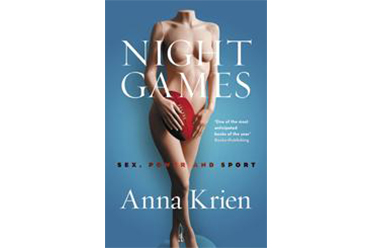 ‘Can you finish me off?’ It’s a casually insensitive remark in a laneway, delivered to a young woman already abused and humiliated by a bunch of footballers and their mates, and it encapsulates an entire cultural paradigm.
‘Can you finish me off?’ It’s a casually insensitive remark in a laneway, delivered to a young woman already abused and humiliated by a bunch of footballers and their mates, and it encapsulates an entire cultural paradigm.
Anna Krien’s ‘Night Games’ is an attempt to peel back the layers of cant and misinformation obscuring the codified and macho world of professional sport, using this single phrase as a kind of centrifugal force around which various arguments and counterarguments spin.
An investigative journalist with one previous book to her name, Krien comes to the world of football as an outsider. There is, at one point in the book, an awkward exchange with an unnamed ‘insider’ that reveals the author’s defensiveness around this fact. Later, a casual mention of her partner’s love of the game seems like a deliberate attempt to prove her credentials in tackling this subject.
It is an odd and unnecessary self-justification, because the only credential required of investigative journalism is a keen hunger to investigate, one that is surely unmitigated by an outsider’s perspective. It could even be argued that outsider status is a boon to the investigative journalist, providing as it does a cool and unbiased viewpoint.
‘Night Games’ concerns itself with the trial of Justin Dyer, accused of raping Sarah Wesley in a laneway outside the home of Collingwood footballers Dayne Beams and John McCarthy. The footballers names are real, as are the media personalities and educational experts littered throughout, but Justin and Sarah – defendant and plaintiff – are pseudonyms, and largely unknowable.
Krien’s access to Justin is limited to court appearances and the odd chat in a nearby café, curbing her ability to paint him in all but the broadest brush-strokes. More debilitating is the total denial of access to Sarah, who refuses to talk to the author and is not seen in court due to legal restrictions.
These limitations don’t have to stymie a book, as demonstrated in Chloe Hooper’s magnificent ‘The Tall Man’, but Krien fails to sufficiently invoke her central characters, and they remain elusive cyphers. In fact, the failures of characterisation are endemic to the book as a whole. The defendant’s mother is described as ‘a largish strong-looking woman’ and a solicitor as having ‘long auburn hair and a Mona Lisa smile’, but no one ever leaps off the page. The contrast to John Safran’s ‘Murder in Mississippi’, with his plethora of oddballs and eccentrics, couldn’t be starker.
Where Krien shines is in her dialectic on the issue of rape and consent in professional sport. The particular trial that forms the backbone of the book is used more as springboard than central plank, and Krien convincingly widens her scope to examine numerous examples of sexism in Australian culture. Her exegesis is a brave one, exploring as it does the unfashionable grey areas surrounding consensual sex.
The author’s unease around the complexities this case raises gives the book its unique power. The doubt and confusion she feels during the investigation throws into chilling relief the fear and powerlessness that the young woman must have felt in the presence of this gang of well-connected young men. If Krien can be confused, she seems to be saying, then imagine how Sarah must have felt.
Casting as wide a net as possible – Krien cites examples from US football codes as well as Australian – the book aims to dredge the swamp of machismo that taints the world of professional sport. Interviews with past players, trailblazing female journalists and equal-opportunity advocates bring a fascinating sociological purpose to the narrative, although most of the time her subjects are preaching to the choir.
It would have been a real coup to interview someone from the other side of the argument; Ricky Nixon, defending his vile behaviour with a 16-year-old girl; Sam Newman explaining his ridicule of Caroline Wilson; one of the footballers present in the bedroom of Dayne Beams.
Without this, Krien is forced to rely on her own responses to previously published material, and while it makes for an interesting cultural study on the effects of sexism on gender relations, it doesn’t really satisfy as insight into a secret world. If the job of investigative journalism is to scale the walled city, by stealth or by force, ‘Night Games’ must be judged a noble failure.
Krien has only managed to loosen a brick or two, and the sense of peering into this world through tiny windows makes for frustrating reading. That central phrase remains as uncomfortable in conclusion as it is in introduction.
Night Games is published by Black Inc. and is available at all leading book retailers. For more information, visit: www.blackincbooks.com/books/night-games for details.
Review: Tim Byrne
